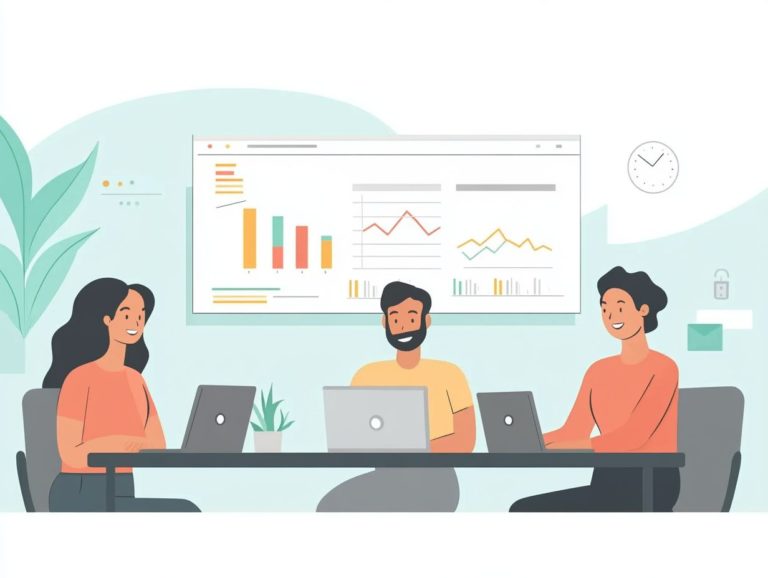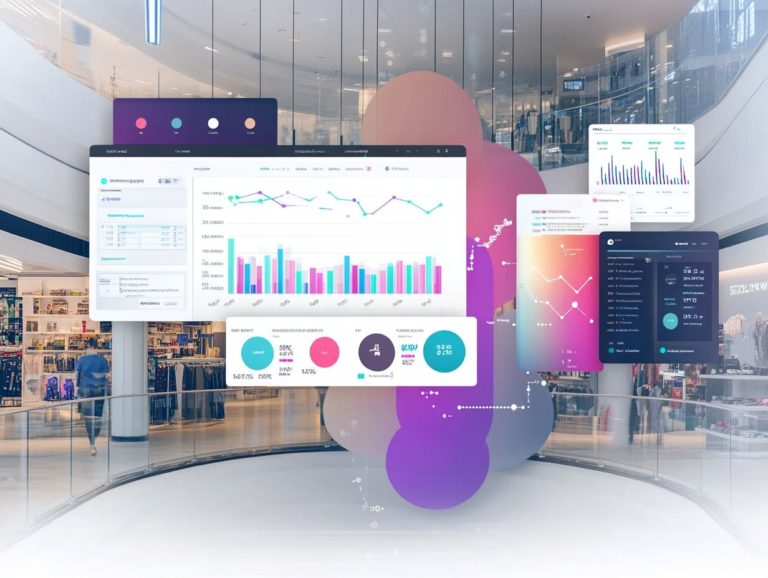14. How CRM Enhances Communication in Healthcare
In the fast-paced realm of healthcare, effective communication is paramount. Let s dive into the important role CRM plays in transforming healthcare today! Customer Relationship Management (CRM) systems are indispensable tools that bridge communication gaps and enhance patient care while elevating overall satisfaction.
This article guides you through existing challenges in healthcare communication and showcases solutions designed to foster seamless interactions between patients and providers.
Explore with us as we unveil real-life success stories and envision a future where CRM profoundly transforms healthcare communication.
Contents
- Key Takeaways:
- The Role of CRM in Healthcare
- Communication Challenges in Healthcare
- How CRM Improves Communication
- Impact of CRM on Patient Care
- Implementing CRM in Healthcare
- Case Studies: Real-Life Examples of CRM in Healthcare
- Future of CRM in Healthcare
- Frequently Asked Questions
- 1. What is CRM in healthcare and how does it enhance communication?
- 2. How does CRM improve patient experience?
- 3. Can CRM help reduce medical errors?
- 4. How does CRM facilitate communication between healthcare team members?
- 5. Is CRM only beneficial for large healthcare organizations?
- 6. Are there any privacy concerns with using CRM in healthcare?
Key Takeaways:

CRM streamlines communication in healthcare by bridging gaps and utilizing effective tools to improve patient-provider interactions and satisfaction. Successful implementation requires understanding its benefits and following proper steps, as seen in real-life case studies. The future of CRM in healthcare holds potential for further advancements that enhance communication and patient care.
The Role of CRM in Healthcare
CRM is crucial in healthcare. It integrates diverse technologies and practices to boost patient engagement and improve operational efficiency, maximizing marketing ROI within healthcare organizations.
By harnessing healthcare CRM solutions, you can manage patient relationships and streamline administrative tasks while ensuring compliance with regulations. This strategic approach fosters stronger connections with patients and optimizes your organizational workflow for greater success.
Overview of CRM and Its Benefits in Healthcare
CRM software acts as your centralized hub for patient profiles, enabling compliance and efficient data management. This system organizes essential information and enhances patient retention rates by nurturing stronger relationships.
With advanced communication tools integrated into the CRM, your healthcare staff can reach out to patients with personalized messages, reminders, and follow-ups, fostering deeper engagement.
Effective feedback mechanisms allow you to gather insights directly from patients, ensuring services are tailored to their needs and preferences.
By leveraging metrics such as marketing ROI, your organization can assess the impact of these strategies on outreach initiatives, refining patient engagement techniques for superior outcomes.
Communication Challenges in Healthcare
Communication challenges within the healthcare sector affect patient engagement and satisfaction levels. These issues often arise from managing consumer data and navigating complex privacy regulations.
Such hurdles can impede effective healthcare delivery and strain the provider-patient relationship, detracting from the quality of care you aspire to provide.
Identifying Communication Gaps in Healthcare
Identifying communication gaps is crucial for developing effective patient outreach strategies that enhance the patient journey. You may notice these gaps as when patient history isn t shared adequately, leading to misdiagnoses and ineffective treatments.
If you re not receiving timely updates on treatment plans, you may feel uninformed and disengaged from your care, fostering frustration and distrust.
The ineffective use of decision-making tools adds to these challenges, causing delays in critical healthcare decisions. The implications of these shortcomings are significant, affecting patient satisfaction and retention rates since unhappy patients are more likely to seek care elsewhere.
To address these issues, healthcare providers can leverage predictive analytics to anticipate patient needs. Additionally, using task management tools can streamline information sharing among teams, ultimately creating a more cohesive and effective care experience for you.
Discover how CRM can revolutionize your healthcare experience today!
How CRM Improves Communication

Customer Relationship Management (CRM) technology elevates communication in healthcare by providing tools that enable seamless interactions between healthcare providers and patients. Adopting the best practices for effective CRM communication can further enhance these interactions.
This enhances patient engagement and streamlines administrative tasks, making your experience smoother and more efficient.
Features and Tools for Effective Communication
Key features and tools of CRM software, such as telehealth integration and analytics, create effective communication in healthcare settings.
These features enhance patient engagement by providing automated reminders that keep appointments and follow-ups front and center.
With telehealth solutions, you can offer virtual consultations, making healthcare accessible and incredibly convenient for your patients.
Analytics tools give you the power to gather and analyze data, providing valuable insights into patient behaviors and preferences.
By leveraging these insights, you can create targeted, consumer-centric messages that resonate with your audience.
Ultimately, this robust engagement strategy fosters better relationships, boosts patient satisfaction, and promotes optimal health outcomes.
Impact of CRM on Patient Care
CRM systems significantly enhance patient care by elevating patient satisfaction.
They achieve this through improved engagement and streamlined communication channels. This allows healthcare providers to respond effectively to your needs.
Enhancing Patient-Provider Communication
Enhancing communication with patients through CRM tools enables personalized interactions and a deeper understanding of their insights.
By harnessing data analytics, you can tailor your messages to meet the unique needs of each individual patient.
This fosters stronger connections and boosts overall satisfaction. Trust builds when patients feel genuinely valued and understood.
To effectively leverage patient data, consider the following best practices:
- Segment your communication based on patient preferences.
- Track engagement metrics to refine your approach.
- Ensure all interactions comply with healthcare regulations.
By implementing these strategies, you cultivate meaningful dialogues that resonate with patients. This paves the way for improved health outcomes and stronger relationships with your healthcare team.
Improving Patient Satisfaction
Improving patient satisfaction is a key objective for healthcare organizations. Leveraging CRM can significantly elevate your healthcare services and operational efficiency.
By gathering and analyzing patient data, CRM systems give you the power to craft marketing campaigns that resonate with individual needs, preferences, and behaviors.
Your healthcare facility could use CRM insights to inform patients about upcoming wellness screenings or vaccination drives. This ensures they receive the right information at the right time.
Operational efficiency gets a boost as these systems streamline processes like appointment scheduling and follow-up communications.
For example, a clinic adopting a CRM solution drastically cuts wait times, making every visit smoother and more enjoyable for your patients.
Implementing CRM in Healthcare

Implementing a CRM system in healthcare demands a strategic approach. This ensures your organization is equipped with the right CRM software to manage patient data effectively while remaining compliant with healthcare regulations.
Careful selection and implementation of your CRM system boosts patient care and makes your operations run more smoothly.
Explore CRM options today or contact us for more information!
Steps for Successful Implementation
To implement CRM successfully, follow a structured process with clear planning and data integration.
Start by defining the objectives your CRM system should achieve. Align them with clinical goals and patient expectations.
Select the right CRM software with features tailored to healthcare providers, enhancing patient interactions.
Involve key stakeholders throughout the process. Their input fosters ownership and ensures diverse perspectives are considered.
Regularly monitor performance metrics to evaluate effectiveness. Adjust strategies to better serve healthcare teams and patients.
Case Studies: Real-Life Examples of CRM in Healthcare
Case studies provide insights into real-life CRM implementations in healthcare. They reveal successes and challenges faced by organizations.
These examples illustrate the transformative power of CRM systems in reshaping healthcare delivery.
Success Stories and Lessons Learned
Success stories show how healthcare providers have enhanced operational efficiency and patient insights through tailored CRM strategies.
They highlight challenges faced in patient engagement and data management, showcasing how innovative CRM solutions have improved operations.
For example, a mid-sized hospital faced scheduling delays, leading to patient dissatisfaction. After implementing a CRM system for online bookings and reminders, patient turnout increased by over 30%.
These stories highlight CRM advantages and offer valuable lessons for other healthcare organizations considering a transition.
Future of CRM in Healthcare
The future of CRM in healthcare is bright, with promising technological advancements on the horizon.
Innovations will enhance patient engagement and improve workflows, ensuring a more efficient and patient-centered experience.
Potential Developments and Advancements

New CRM technologies, like improved telehealth integration and advanced analytics tools, will change how healthcare providers interact with patients.
These advancements will enable real-time communication and personalized care strategies.
For instance, AI-driven analytics can help healthcare teams anticipate patient needs, allowing for tailored treatment plans that truly resonate.
As the landscape evolves, it s crucial to stay informed about these technological shifts.
By adapting CRM strategies to embrace these advancements, you enhance efficiency and improve patient experiences.
Frequently Asked Questions
1. What is CRM in healthcare and how does it enhance communication?
CRM stands for Customer Relationship Management. It helps healthcare providers manage and improve communication with patients and other professionals.
It enhances communication by providing a centralized platform for patient information, appointment scheduling, and team communication.
2. How does CRM improve patient experience?
CRM improves communication and access to information, leading to a more personalized and efficient patient experience.
Patients can easily communicate with providers, access their records, and receive timely appointment reminders.
3. Can CRM help reduce medical errors?
Yes, Customer Relationship Management (CRM) can reduce medical errors. It ensures all healthcare team members access accurate and up-to-date patient information.
4. How does CRM facilitate communication between healthcare team members?
CRM allows healthcare team members to communicate easily through a secure, centralized platform. They can share patient information and collaborate on treatment plans, leading to better coordination and improved outcomes.
5. Is CRM only beneficial for large healthcare organizations?
No, CRM benefits organizations of all sizes. Even small practices can enjoy streamlined communication and improved patient experiences, helping them compete with larger entities.
6. Are there any privacy concerns with using CRM in healthcare?
Using technology in healthcare does raise privacy concerns. However, CRM systems are designed with security measures in place, ensuring only authorized personnel access patient information and comply with HIPAA regulations to protect privacy.






